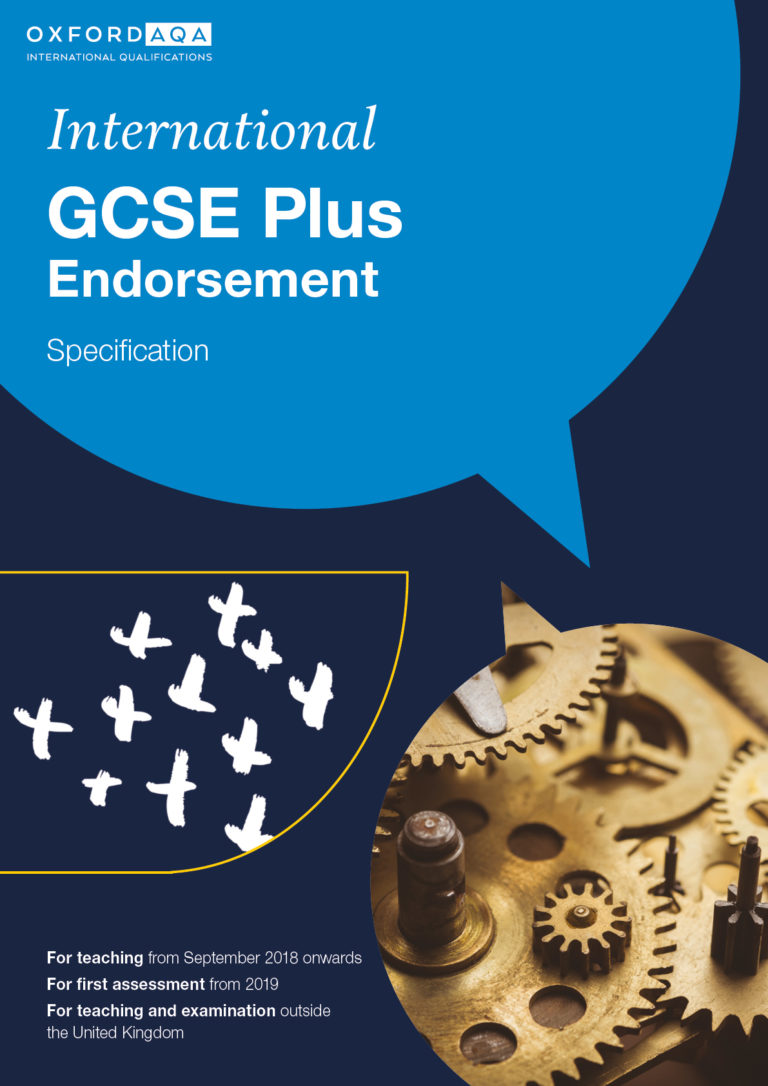
Uncover an exciting way to foster creativity, develop research skills and encourage independent learning at GCSE level.
International GCSE Plus is an optional endorsement that students can take as part of their OxfordAQA International GCSEs. It provides an opportunity for students to achieve an additional Pass, Merit or Distinction alongside their 9-1 grades.
- Each project requires 20 hours of supervised independent study following 10 hours of skills learned through the taught curriculum.
- The taught skills curriculum features guidance on what to cover in the Scheme of Work, as well as ‘off-the-shelf’ teaching resources in the form of 10 classroom handouts.
- Students submit a 2000-word report alongside their Progress Diary. Projects are graded by the supervisor using the assessment criteria provided in the specification.
“It would give students a chance to shine in their chosen subject.”
What to study in conjunction with International GCSE Plus?
International GCSE Plus is designed for maximum flexibility. Projects can be started in Year 9, 10 or 11 and students can submit one or more International GCSE Plus projects alongside any of the following OxfordAQA International GCSEs:
- Accounting (from June 2026)
- Biology
- Business
- Chemistry
- Combined Science
- Computer Science
- Design and Technology: Product Design (from June 2025)
- Economics (from June 2025)
- English Literature
- English as a Second Language
- French (from June 2025)
- Geography
- Islamiat (from June 2026)
- Mathematics
- Media Studies (from June 2026)
- Pakistan Studies (from June 2026)
- Physics
- Psychology (from June 2025)
- Spanish (from June 2025)
- Urdu (from June 2026)
Whilst each project must explore its associated International GCSE subject, there are opportunities for students to connect the subject to another area of interest and apply their research across various disciplines.
International GCSE Plus endorsement
Schools must enter candidates for an OxfordAQA International GCSE in order for them to be eligible for entry into the International GCSE Plus endorsement.
International GCSE Plus entries should be made when candidates are entered for their standard International GCSE assessments, in a similar way to coursework.
Students develop an initial idea that they wish to carry out and discuss this with a supervisor. They then:
• Carry out research to enable them to sufficiently develop aims and objectives to make a formal proposal.
• Document their progress on an on-going basis in the Progress diary.
• Meet with the supervisor on a regular basis to discuss progress and issues.
• Produce an appropriately referenced 2,000-word written report that achieves the aims and objectives they set themselves.
• Review the organisation of the work, the research and the written report.
The school will allocate a supervisor to each student. We advise that the number of students allocated to each supervisor should take into account the supervisor’s other commitments. We recommend that the supervisor should be either (a) the student’s teacher in the relevant GCSE or (b) another teacher of the same subject.
Supervisors will:
• Meet with the student to discuss initial ideas.
• Formally comment on the student’s proposal (using the criteria in Section 2.4) of the specification.
• Meet with the student on a regular basis to discuss progress and issues.
• Assess the student’s work holistically, applying the assessment objectives.
• Endorse each student’s Progress diary by signing the appropriate sections including:
- A declaration that the evidence submitted for assessment is the unaided work of the student.
- A confirmation that no work assessed for International GCSE Plus will also be submitted, or has been submitted, for any other qualification(s).
1. Getting started
- Introduction to International GCSE Plus
- Accurately interpret the requirements of International GCSE Plus
- Developing ideas into research questions
- Planning and managing the work
2. Research skills
- Resources (places, people, media, books, internet, specific journals, etc)
- Primary and secondary research
- Taking a critical approach to sources
- Taking an ethical approach to research
- Making the best use of resources
3. Report writing
- Producing an appropriately presented report
- Appreciating the difference between narrative and evaluative report writing
- Formally acknowledged forms of referencing
- Avoidance of plagiarism
- How to produce a bibliography
- Conclusion
- Proof reading and editing (including an appreciation for word limit)
OxfordAQA provides all the resources and advice you need to teach the International GCSE Plus specification effectively.
- Download the specification
- View our teacher guidance
- View our training courses to help you deliver International GCSE Plus
- Download the guide to student-led investigations
We have too many resources to list here, so please visit our resources area for teachers to see them all, including:
- Schemes of work to allow you to plan how to deliver the specification in a way that will best suit you and your students
- Teaching guidance to outline clearly the scope of teaching and learning
- Taught skills handouts to help delivery of the International GCSE Plus taught skills
- Supervisors attribute a grade of Pass, Merit or Distinction to the overall project using guiding descriptors for each of the four Assessment Objectives:
- AO1 = Organisation
- AO2 = Research
- AO3 = Realisation
- AO4 = Review
- The supervisor (or the school) then submit grades to OxfordAQA for verification.
- Students who do not achieve their desired grade need not have their International GCSE Plus submissions entered.
- Supporting assessment resources include exemplar titles, exemplar Progress Diaries and written reports for each grade. We require schools to participate in standardisation training prior to submissions.
- Find out more about the benefits of extended project work
- Take a look at our common questions on the International GCSE Plus
You must be an approved OxfordAQA centre to enter students for our exams. Make sure you become an OxfordAQA centre before you start teaching a course.




